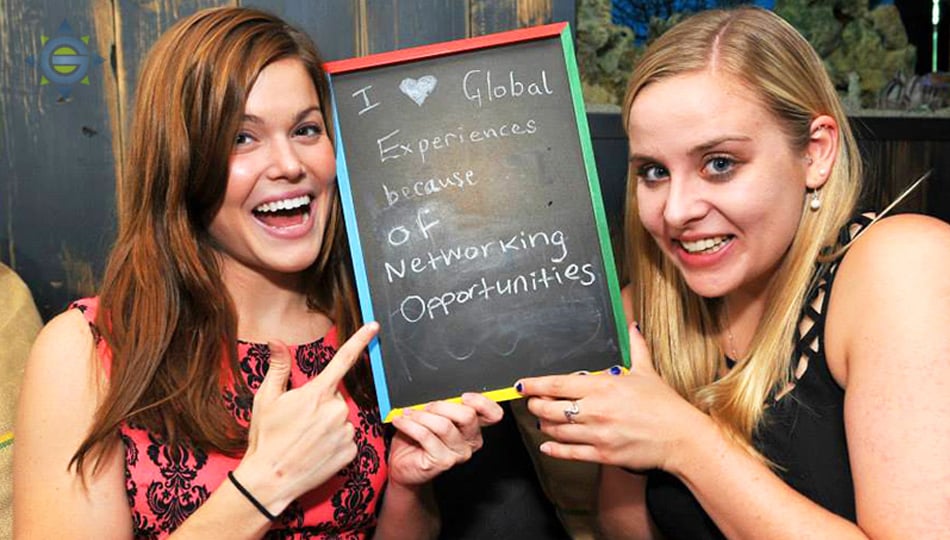You might think a degree and some professional experience is enough to kickstart a great career, and you would be partially right - both of those things are invaluable to building a successful career. However, there is one more thing you’ll need to set yourself apart from the rest of the pack, a network of diverse professionals.
Although networking may seem daunting and time-consuming, successfully networking can lead to great opportunities and long-term career success. Read over our 7 tips on how to network.
1. Find an event

The first step to successful networking is going out into the world and meeting new people. If you look hard enough, you’ll find plenty of networking events you can attend. Sites that can help you find events include:
- Meetup.com
- University career pages
- Alumni groups
- Eventbrite
- Eventful
Even a simple google search can help you find career events in your area. Events can vary in size and nearly every career field. However, don’t just stick to networking events that are specific to your career field. General networking events can also help you build bridges that will lead to your next great career opportunity.
Networking events don't have to be the typical suit and tie affairs. It's easy to grow your network by joining a sports league, volunteer group, or organization with like-minded people. You never know which connections will lead to your next job offer.
2. Know your style
Your personality may end up dictating the way you network. Not every style of networking is going to work for everyone.
If you’re comfortable in large crowds and don’t mind introducing yourself to a lot of people, then a large networking event may be perfect for you. Usually, these bigger events are a bit more casual and allow participants to create a lot of new connections. If you’ve got the outgoing personality that thrives on social interactions, these events are the perfect place to start building relationships.
Don’t panic if huge networking affairs aren’t you’re style; some of the most valuable networking you can do is one-on-one. Don’t be afraid to reach out to someone in your career field and ask for a quick chat. Most people are more than happy to have a phone call or a face to face meeting if you reach out in a professional manor.
3. How to network at an event

A large part of networking is proving your value and presenting your talents, and you won’t be able to do that without a plan. Before you even think about stepping into a networking event, think about how you can talk about your strengths, talents, and what connections you can offer. Map out how you can help someone either now or in the future.
Being good at conversation also means knowing when to listen. Networking isn’t all about you explaining yourself, and you’ll want to let others lead the discussion at times. If you do all the talking, the other person may feel you are uninterested in them.
Don’t be afraid to ask questions; it’s a great way to show you are interested and invested in the person you’ve just met. Some excellent questions to ask are:
- How did you get into this field?
- What do you enjoy the most about your job?
- What skills/experience do I need to start building to be successful in this field?
- Is there anyone you recommend I talk to next? May I mention you referred me?
Remember not to keep the conversation going too long, and to thank the person for their time.
4. It’s not all about the elevator pitch
While you search for a job and line up interviews, the one question you’re guaranteed to be asked is “tell me about yourself.” It’s a hard question to answer, and you’ll spend a good portion of your interview prep trying to craft the perfect answer.
You’ll be told your answer should be around 60 seconds long, and it’ll become what’s known as your elevator pitch. It’s the short speech you would give if you only had a minute with someone.
Although it’s true you need a well-crafted elevator pitch, don’t solely rely on it for networking. Networking isn’t the same as an interview; it’s less about getting a job and more about building bridges for the future – so be friendly and be personable. Be the person people will want to spend time around and work with down the road.
5. Don’t ask for a job
If you start networking just to land a job, you’re going about it the wrong way. Networking isn’t about asking for a job, or handing out your resume to anyone who will take it. These tactics come across as selfish and desperate.
No one wants to make a connection with someone who is only networking with their own interests in mind. Instead of coming right out and asking for a job, request information that will help you in your job search. Your primary goal should be to make connections that may benefit you for future opportunities.
A new connection might be willing to refer you or even tell you about an opening before it’s even been announced. It's always good to be generous and help others, so that they'll want to return the favor someday.
6. Have the right tools

To successfully network, you’ll need more than a smile and friendly demeanor. You’ll need the right tools. Some of the tools you’ll want to hone are:
- A strong resume: A well-organized resume with all the necessary information. At networking events, you may not be handing out a resume to everyone you meet, but it doesn’t hurt to carry a few extra copies with you.
- LinkedIn: The professionals you meet will want to connect with you. Treat your profile like a resume, make it professional and have all the necessary information.
- Business cards: Business cards are helpful in making a great first impression, and they’re easier to carry around than a stack of resumes. An effective business card can be as simple as your name, career field/profession, and contact information.
- Website/portfolio: For anyone primarily attending creative networking events, a website/online portfolio is a must. The connections you make are going to want to find your work on more than just social media. There are plenty of cheap and easy sites that can help you set up your own page.
Remember to dress a little more formal than the event suggests. You’ll most likely run into someone important, and you want to make sure you’re dressed to impress.
7. Stay in touch
 You could have the most fabulous business card or most engaging conversation at a networking event, but if you fail to follow-up, you’ll fail at making a genuine connection. Within forty-eight hours of meeting someone, make sure to send them a brief email or LinkedIn message.
You could have the most fabulous business card or most engaging conversation at a networking event, but if you fail to follow-up, you’ll fail at making a genuine connection. Within forty-eight hours of meeting someone, make sure to send them a brief email or LinkedIn message.
Use your message to remind your new connection of who you are and what you discussed. Try to follow up with your contacts every few months, and the ones you want to build a closer professional relationship with at least once a month. Some ways to follow up are:
- Send articles related to their career that could lead to conversation.
- Mention a new connection you can introduce to that person.
- Offer opportunities you think may interest that person.
LinkedIn pro tips
With so many steps that go into great networking, it can be easy to forget about LinkedIn. However, LinkedIn is going to be one of the most important and powerful tools when networking and job hunting. Follow these tips below to make sure you’re networking on LinkedIn the right way:
- Profile picture: Make sure you have a professional headshot. You’ll want to be dressed in formal business clothing, and have a plain background behind you. Look at other professionals in your industry and see what their pictures look like, it’s a great way to gauge what's an appropriate profile picture for you.
- Join groups: LinkedIn is full of fantastic career groups that allow you to network with like-minded professionals from around the world. Join a handful of useful groups and stay active.
- Staying active: In your groups and on your profile you’ll want to stay active. Post thoughtful content at least once a week and add to discussions. Make sure what you’re contributing is professional and well written.
- Send a personal message: When reaching out to someone in your industry or a new connection, make sure to send a personal message. No one wants to receive a generic message titled “please join my LinkedIn.” Do a bit of research and make each message personal; talk about a project that connection worked on or offer something you can do for them.
- Listing relevant experiences: Only list your relevant professional experiences. You don’t need to list the jobs you had in high school or part-time employment you had in college. List experiences that are unique to your career and help you stand out like an international internship.
- Keywords: Filling your profile with keywords will ensure you come up when people search for those words. Aim to put your keywords in your skills section and job descriptions. Don’t try to force every keyword into one section, spread them out through your profile naturally.
Never stop networking

There’s no point in your career when you no longer need to network. Networking is a career-long process you should never stop. Find the value in each and every person you talk to. It doesn’t matter what title that person may have - take a genuine interest in them and ask questions.
Don’t think that just because the person doesn’t have the title of CEO doesn’t mean they can’t be a valuable connection. In fact, it’s usually easier to build a lasting relationship with someone who is early on in their career. You never know when a small connection may turn into a big opportunity.
Networking is a skill you need to hone continually. You might not find your next great opportunity in the course of two hours, but if you stick with it, you’ll see the power of networking. Go out there, take some risks, meet new people, and you’ll see how far networking can take you.






















